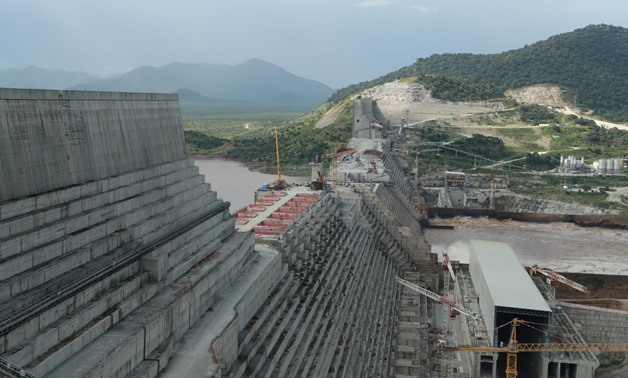
FILE - Ethiopia's Grand Renaissance Dam is seen as it undergoes construction work on the river Nile in Guba Woreda, Benishangul Gumuz Region, Ethiopia September 26, 2019. REUTERS/Tiksa Negeri
CAIRO – 2 July 2020: Egypt’s Irrigation Minister slammed Ethiopia’s behavior to hamper the course of negotiations on the Grand Ethiopian Renaissance Dam, saying that Egypt will thwart any attempt of transgression against its rights, state’s MENA cited the irrigation minister as saying to DMC channel.
This comes two days after Foreign Minister Sameh Shoukry voiced Egypt's concern about the dam's safety on lives of more than 150 million Egyptian and Sudanese citizens in a UN Security Council meeting on GERD.
Irrigation Minister Mohamed Abdel Aaty said Sudan is concerned about the consequences in the event of the dam collapse, adding that such collapse will cause a 16-meter wave that would significantly cause damages in Sudan. Egypt seeks a written agreement that would save the rights of people of Sudan and Egypt, he added.
“Sudan is very concerned about the safety of its dams and about the effect of the Renaissance Dam. The impact of the Renaissance Dam worries Sudan in two cases; the first is the collapse, this is considered a complete devastation of Sudan,” Abdel Aaty said, adding that in case GERD raised a volume of water that is larger than the maximum volume of water expected in floods, it will start to damage the Sudanese dams.
In his speech at the Security Council meeting on the dam, Foreign Minister Shoukry denounced absence of guarantees on the safety of the Ethiopian dam on the downstream countries [Egypt and Sudan].
“While we recognize the importance of this project to the developmental objectives of the Ethiopian people, a goal that we share and support, it is essential to realize that this mega-dam, which is Africa’s largest hydropower facility, potentially threatens the welfare, wellbeing, and existence of millions of Egyptian and Sudanese citizens,” Shoukry said.
“Therefore, the unilateral filling and operation of this dam, without an agreement that includes the necessary precautions to protect downstream communities and to prevent the infliction of significant harm on their riparian rights, would heighten tensions and could provoke crises and conflicts that further destabilize an already troubled region.”
“As a responsible stakeholder, Egypt elected to bring this matter to the attention of the Security Council to forestall further escalation and to ensure that unilateral actions do not undermine efforts to reach an agreement on the GERD or prejudice the riparian rights and interests of downstream states, or, more alarmingly, to endanger the lives of almost 150 million Egyptian and Sudanese citizens, thereby generating greater tension in an unstable region.”
Abdel Aaty said Ethiopia is sticking to unilateral decisions for filling the massive dam and is withdrawing from all agreements reached in the Washington meeting with the participation of the three countries concerned.
The minister noted that Egypt is a dry country, affirming that filling the dam during the time of dryness will result in a huge crisis.


Comments
Leave a Comment